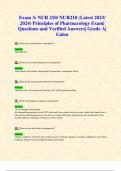Exam 3: NU R 210/ NUR210 (Latest 2023/ 2024) Principles of Pharmacology Exam| Questions and Verified A nswers | Grade A | Galen Q: What type of medication is metoprolol? Answer: Beta Blocker Q: What are the contraindications for metoprolol? Answer: heart block, heart failure, bradycardia, hypotension, cardiogenic shock Q: What are the nursing interventions for metoprolol? Answer: baseline vitals, liver and renal function, AST, LDH, patient teaching Q: What is the patient teaching for metoprolol? Answer: do not abruptly stop therapy d/t rebound hypertension, avoid OTC meds until you consult with a provider, medic alert band, how to take a pulse and blood pressure, rise slowly to avoid orthostatic hypotension, low sodium diet, limit alcohol and have Glucagon on hand to reverse effects Q: What are the side effects of metoprolol? Answer: fatigue, weakness, dizziness, dry mouth, nausea, vomiting, diarrhea, insomnia, nightmares, drowsiness, headache, blurred vision, peripheral edema and tinnitus Q: What are the adverse effects of metoprolol? Answer: bradycardia, hypotension, stroke, thrombocytopenia, diabetes mellitus, bronchospasm, agranulocytosis Q: Why do we give prazosin hcl? Answer: control hypertension Q: What is the productive positive effect of prazosin hcl? Answer: decrease blood pressure to a normal range of < 120/80 mmHg Q: What patient teaching is needed for ACE inhibitors? Answer: do not abruptly discon - tinue, do not take OTC meds without first consulting a provider, no salt substitutes, slow to rise due to orthostatic hypotension, how to take blood pressure Q: What cultural considerations are there for ACE inhibitors? Answer: not to be used during pregnancy, elderly and African Americans respond poorly to this drug clas - sification Q: What are the side effects of ACE inhibitors? Answer: cough, orthostatic hypotension, weakness, renal impairment Q: What are the adverse effects of ACE inhibitors? Answer: angioedema, hyperkalemia Q: What is the #1 side effect of lisinopril? Answer: constant irritating cough Q: What type of drug is Valsartan? Answer: Angiotensin II Receptor Blocker (ARB) Q: What labs do you monitor for patients on Valsartan Answer: potassium, AST, ALT, BUN, creatinine, hemoglobin, hematocrit Q: What are the side effects of hyperkalemia? Answer: oliguria, nausea, abdominal cramping, tachycardia, weakness, parathesia Q: What is the therapeutic response of HCTZ? Answer: increase urination, decrease blood pressure, decrease edema, decrease cardiac output and preload Q: What type of drug is HCTZ? Answer: thiazide diuretic Q: What are the side effects of Lasix?




